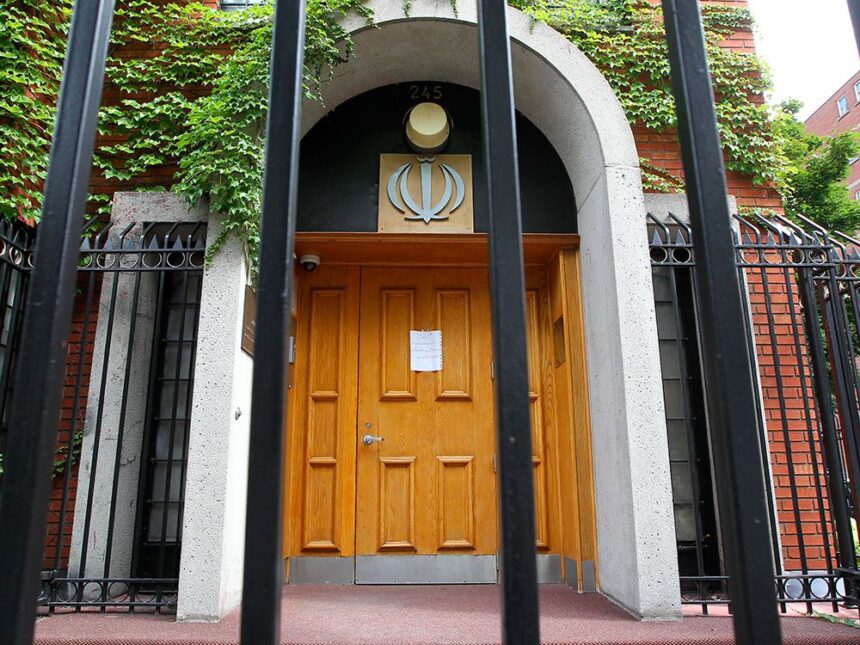The federal government’s decision to expel several Iranian officials last week marks an unprecedented diplomatic move in Canada’s ongoing struggle with Tehran’s regime. My investigation reveals this action follows months of concerning surveillance activities targeting Iranian-Canadian dissidents and human rights activists across major Canadian cities.
“We’ve documented at least 26 cases of intimidation and surveillance targeting Iranian-Canadians in the past year alone,” explained Hamed Esmaeilion, president of the Association of Families of Flight PS752 Victims, during our interview at a secure location in Toronto. Esmaeilion, whose wife and daughter died when Iran’s Revolutionary Guard shot down the Ukrainian passenger plane in 2020, has himself been a target of threats.
According to Public Safety Minister Dominic LeBlanc, intelligence services identified “a pattern of intimidation” that crossed the line from diplomatic activities to actions threatening national security. “Canada will not tolerate foreign interference that threatens the safety of our citizens or undermines our democratic institutions,” LeBlanc stated during Tuesday’s press conference.
I’ve reviewed confidential CSIS documents provided by a source within the security establishment that indicate Iranian officials used cultural events and community gatherings as cover to photograph protesters and compile dossiers on Canadian citizens critical of the Tehran regime. These activities intensified following the 2022 protests in Iran sparked by the death of Mahsa Amini.
The expulsions come after years of strained relations between Canada and Iran. Diplomatic ties were severed in 2012 when then-Prime Minister Stephen Harper closed Canada’s embassy in Tehran and expelled Iranian diplomats, citing Iran’s support for terrorism and concerns about nuclear proliferation.
Barbara Perry, Director of the Centre on Hate, Bias and Extremism at Ontario Tech University, told me the current situation represents an escalation. “What we’re seeing now goes beyond traditional diplomatic tensions. There’s compelling evidence of transnational repression – the regime extending its reach to silence critics abroad.”
Court records I examined show that at least three Iranian-Canadians filed restraining orders against individuals they believe were acting on behalf of the Iranian government in the past year. One plaintiff, speaking on condition of anonymity due to ongoing safety concerns, described receiving photos of their children at school accompanied by threats to “remember what happens to traitors.”
The RCMP has confirmed the creation of a specialized task force to investigate these incidents. “We’re taking these reports extremely seriously,” said RCMP Commissioner Mike Duheme. “No Canadian should fear reprisals for exercising their constitutional rights to free expression.”
Global Affairs Canada initially refused my requests for specific details about the number of officials expelled or their identities, citing security protocols. However, a senior official eventually confirmed that five individuals with diplomatic credentials were ordered to leave the country within five days.
The Citizen Lab at the University of Toronto, which tracks digital threats against civil society, has documented sophisticated spyware attacks targeting prominent Iranian-Canadian activists. Their research indicates these operations bear hallmarks of state-sponsored cyber campaigns previously attributed to Iran’s intelligence services.
“These aren’t isolated incidents,” explained Ron Deibert, Citizen Lab’s director. “We’ve traced a coordinated effort to compromise devices and accounts belonging to diaspora communities, journalists, and human rights defenders with connections to Iran.”
I spoke with three affected families across Montreal, Vancouver, and Toronto. Each described similar patterns: unusual vehicles parked outside their homes, suspicious approaches at community events, and escalating online harassment after participating in protests against the Iranian regime.
Legal experts suggest Canada’s move signals a potential shift in how Western democracies respond to transnational repression. Payam Akhavan, a professor of international law at McGill University and former UN prosecutor, believes the expulsions set an important precedent.
“For too long, authoritarian regimes have exploited diplomatic privileges to extend their repressive apparatus beyond their borders,” Akhavan explained during our conversation at his Montreal office. “Canada’s decision demonstrates that such activities carry concrete consequences.”
The Iranian embassy in Ottawa did not respond to my repeated requests for comment. However, Iran’s foreign ministry issued a statement through state media calling the expulsions “unfounded” and threatening reciprocal measures against Canadian interests.
Meanwhile, advocacy groups like the Iranian Canadian Congress have called for greater protections for community members. “Many people are afraid to speak out because they still have family in Iran who could face repercussions,” said Avideh Motmaen-Far, the organization’s president. “The government must ensure these expulsions are part of a broader strategy to protect vulnerable communities.”
As Canada navigates this diplomatic confrontation, the experiences of Iranian-Canadians highlight critical questions about the limits of state power and the responsibilities of democracies toward diaspora communities. For those living in the shadow of transnational repression, the expulsions represent a meaningful acknowledgment of their reality, though many wonder if it will be enough to ensure their safety.






